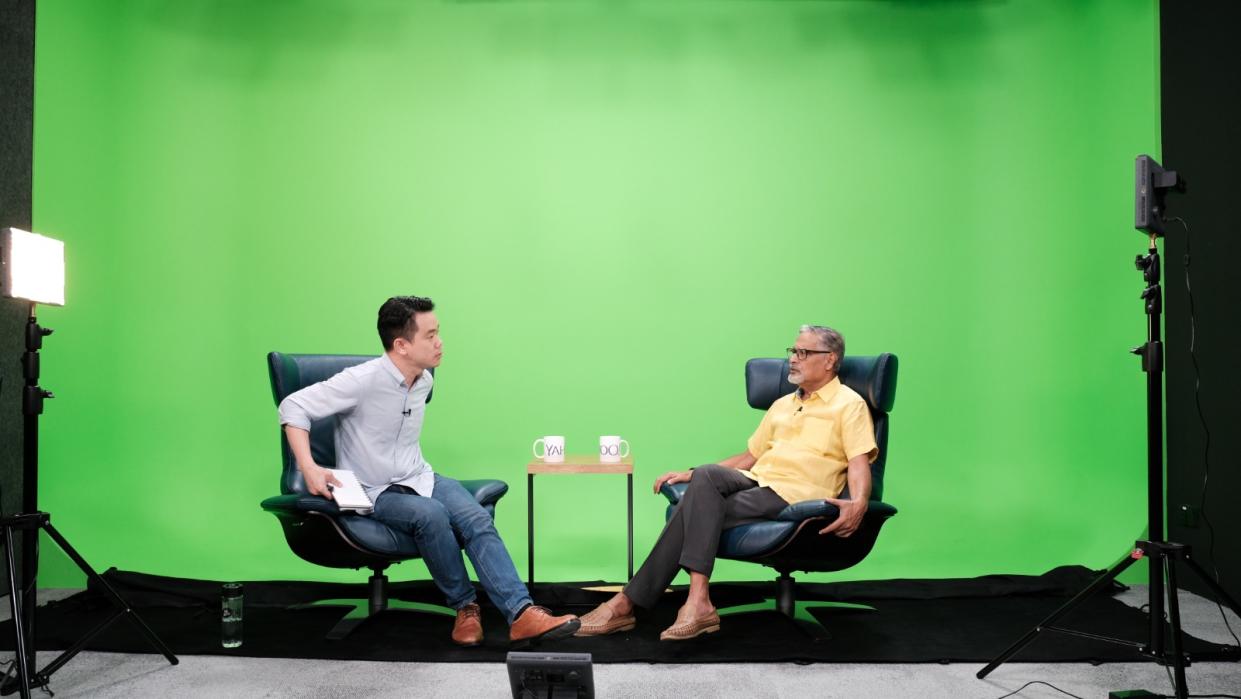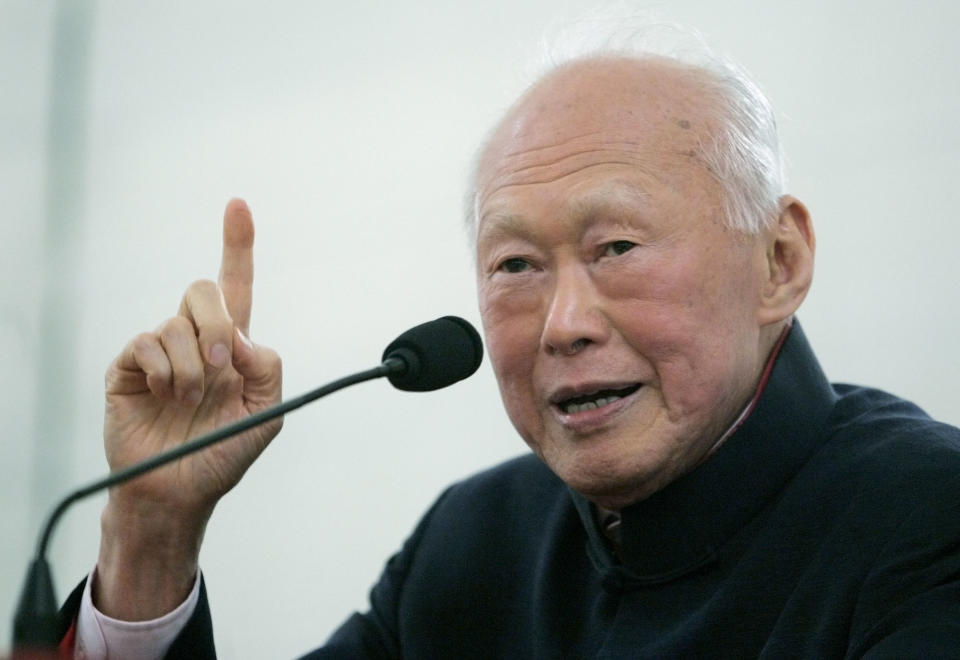Lee Kuan Yew made journalists 'look behind their backs': veteran journalist PN Balji

SINGAPORE — If there is one central figure that looms large in veteran journalist PN Balji’s new book “Reluctant Editor: The Singapore Media As Seen Through The Eyes Of A Veteran Journalist”, it is the late Singapore prime minister Lee Kuan Yew.
“There were many (journalists) who were penalised by him because he didn’t like what they wrote…and that made a lot of people frightened and made many people look behind their backs,” mused Balji, who counts himself among those to fear incurring Lee’s wrath. As he ruefully says in his book, “Nearly every editor in Singapore has a Lee Kuan Yew story to tell.”
On one occasion, Balji chose to ignore what he saw as an unreasonable embargo on Lee’s Chinese New Year message in 1981 and went to print. The then-New Nation acting editor later received an angry response from Lee via his press secretary, “Who is that journalist practising Western-style journalism?”
While Balji got off with a warning, many others did not. “His record with journalists who veered off the straight and narrow path was legendary. Some have been detained without trial, some blackballed and others forced to leave journalism and even the country,” writes the 70-year-old, who also details stories of colleagues being punished for their outspokenness.
But the genius of Lee, who was never afraid to actively intervene in the media industry, lay in his ability to mix the carrot and the stick. “He made sure that Singapore Press Holdings and of course Mediacorp, had no competition. And that had a positive effect because SPH could make tonnes of money. Nobody (else) was prepared to come and work or start a newspaper or TV station under those kinds of restrictions.”
Balji added, “So SPH could boom and when SPH boomed, people like us also boomed, because we got good salary increments.”
The Reluctant Editor

Speaking to Yahoo News Singapore – for whom he contributes commentaries and analysis – Balji was by turns stoic, candid and yet optimistic about journalism in Singapore. “Reluctant Editor”, published by Marshall Cavendish and launching in mid-June, mainly covers his 10-year stint as The New Paper (TNP) editor and his first spell as editor of online tabloid Today, across 35 years in the mainstream media.
The title of the book stems from his initial unwillingness to take on the role when asked to become TNP editor in 1990, due to health issues and family commitments. The father of two only agreed to it when his wife gave him the go-ahead.
The book includes a detailed analysis of the events that led to TNP’s darkest hour in 1996, when the paper mistakenly reported that former Deputy Prime Minister Dr Toh Chin Chye had been arrested for his alleged involvement in a hit-and-run. It led to the demotion of two editors, one journalist sacked and the payment of $300,000 in damages to Dr Toh. Balji put the episode down to “a footloose newsroom culture” gone wrong.
Other run-ins with the government are covered, such as when then-Communications and Labour Minister Ong Teng Cheong summoned senior SPH editors to a press conference in 1981 and demanded that they identify their unnamed sources for a story they had run about impending bus fare hikes. The editors declined.
Balji alludes to “an ever-watchful officialdom scrutinising and second-guessing” stories and adds, “In a newsroom that felt under siege, journalists turned fearful.” As with his commentaries, he does not waste time on pretty prose. His writing is concise and to-the-point, with a keen eye for the key details and a newsman’s sense of drama.
There are controversial revelations aplenty, such as what transpired behind the scenes during the 1997 General Election, when TNP ran a front page story about Workers’ Party politicians Tang Liang Hong and JB Jeyaratnam filing police reports against PAP ministers.
In the footsteps of OB Markers
With its insider details and frank admissions of government interference – “The media was given specific instructions not to report the increments that were given every year to the ministers for fear that putting that kind of information in the public domain would reignite acrimonious debate and stoke public anger.” – “Reluctant Editor” brings to mind a 2012 book by another former SPH editor with its title based on a Singapore-specific media term: out of bounds (OB) markers.
And when asked why he had chosen to write his book more than 10 years after leaving the mainstream media, Balji pointed to “OB Markers: My Straits Times Story” by former Straits Times editor Cheong Yip Seng as his inspiration. “It was the first book written by an established editor from SPH which actually said that there was government intervention, and he gave some examples,” noted Balji.
“Which of course, annoyed the government to a great extent…because now it cannot tell people that we don’t intervene in the media.
He added, “The motivation is that…if I can bring some some more stories, expand on what Cheong Yip Seng has said, I think it would lead to a greater understanding of Singapore media and its interactions with the Singapore government.”
Writing the book, Balji said, was “mental torture”, partly because of the ever-present fear of libel, and the fact that he was writing about former colleagues and friends.
The dangers of self-censorship
Balji may have been a reluctant editor, but he was far from reticent in calling self-censorship “the greatest sin in Singapore journalism”. And as far as he is concerned, it is “worse than what it used to be before.”
As an example, he pointed to recent mainstream media coverage the day after a decision was made by Malaysia and Singapore to scrap the Instrument Landing Systems (ILS) at Seletar Airport in favour of Global Positioning System-based (GPS) instrument procedures.
“As a reader, I would like the newspapers and/or media to tell me: which is a better system, GPS or ILS?,” said Balji of the bilateral dispute that led to the move.
“And I would like the question answered – maybe I’m asking for too much – who blinked? Who blinked first? Seriously, that’s the kind of question you need to ask, but we are not asking.
“They will say, we cannot do this because it will upset Mahathir, for example. Then what you do about your profession? So I think that the fear factor is always there.”
Fake news laws
With impending anti-fake news legislation on the horizon, which will give ministers wide-ranging powers to determine what a falsehood is, journalists in Singapore are uneasy as to what these 21st century OB markers will mean. But Balji is surprisingly sanguine about the future under a “smart government”.
“It will do certain things, but knows where it won’t cross the line because Singapore wants to bring in a lot of Investments here. And also that Singapore plays this game between let’s say, China and the US, so it needs as many friends as possible. It needs the Google, the Facebooks of this world to be here. So I think it would also be careful about going to the extreme.”
And Balji was convinced that like Lee Kuan Yew, the present-day leadership recognises that quality journalism is in its self-interest, especially as The Straits Times is losing its readership every quarter.
“And if more and more people are not reading the Straits Times, who is the biggest loser? It’s the government…so I don’t think the government is that stupid.”
“Reluctant Editor “by PN Balji is published by Marshall Cavendish and is slated for launch in mid-June.
Related stories
Virtually anything can be deemed ‘misleading’ under fake news law: historian Thum Ping Tjin
COMMENT – Fake news bill: Time for lawyers, MPs to stand up and be counted



